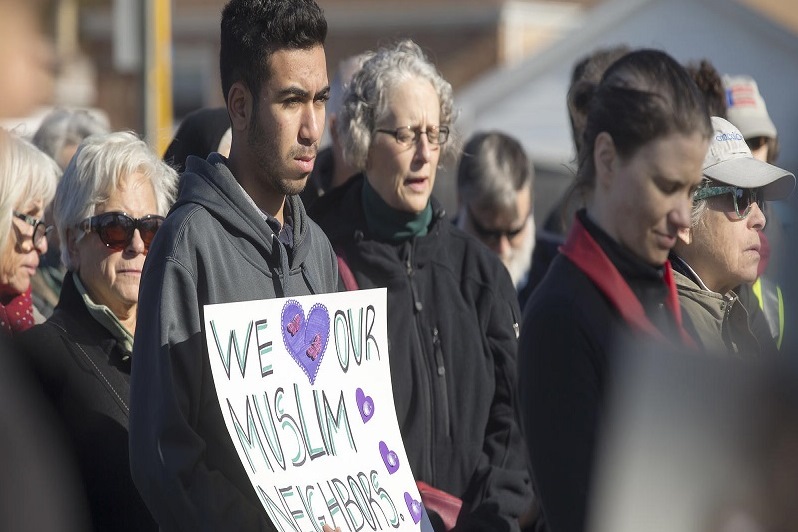
RNA - Karen Danielson just wanted to have a dialogue. She was frustrated by the anti-Muslim rhetoric of the election season and of how President-elect Donald Trump had called for a ban on Muslim immigration in the U.S.
She was hurt by the hateful language so much that during a recent visit to Navy Pier, she suddenly froze with fear. Could somebody, she wondered, sneak up and push her into the water because of the veil that hid her hair?
Danielson, who was raised Catholic and converted to Islam in college, initially wanted to hold an interfaith gathering denouncing Islamophobia before the election, but had worried it would be mistaken for an anti-Trump rally. But after Trump won the election Tuesday, Danielson, an interfaith and outreach director for the Muslim American Society, knew it was time to pull the community together.
"I don't think bigotry won the election," she said. "But we do know bigotry played some role."
On Saturday, more than 100 people of different faiths crowded the parking lot of First United Methodist Church in Oak Lawn to denounce the anti-Muslim vitriol spurred by the election season. Community members listened to Muslim, Christian and Jewish leaders speak and brought signs sprinkled with hand-drawn hearts that read, "We stand with our Muslim neighbors!" and "United against hate."
After a brief rally, organized by Jewish Voice for Peace and other interfaith groups, community members split up into teams and traveled to businesses across Oak Lawn, asking owners to post signs in their windows that read "We support our Muslim neighbors."
Those who spoke at the rally congratulated Trump and commended the democratic process. But they demanded Trump's administration denounce the verbal attacks on Muslims and revoke his pledge to deny entry to the country to all Muslims. Religious tolerance, they said, is among America's core values.
In recent months, Trump had suggested that instead of banning all people of the Muslim faith, he would target those from countries connected to terrorism. However, initial statements regarding the proposed ban were on his campaign website in days after the election, and on Thursday he walked away from reporters who asked whether the plan was still on his agenda.
Michael Kooy, of the Oak Lawn Clergy and Religious Workers Association, said it's important for his fellow Christians to stand alongside those of other religions because it makes them more compassionate. Working with Muslims, he said, has made him a "better Christian."
"Certainly it's the job of the government to protect us from violence — the violence of terror, the violence of religious profiling, the violence of defamation, the violence of assault," he said. "And some perceive they are threatened or see the harm that may come their way. Mercy urges me to stand up with people who are threatened in these ways."
Barbara Lyons, a 79-year-old member of Jewish Voice for Peace who works on its anti-Islamophobia committee, led a group of 10 community members up and down 95th street, visiting businesses and asking their employees to post fliers supportive of Muslims in the windows of their shops. An employee at Chimera's Comics said the business has several Muslim customers, and that they should always feel welcome.
Lyns said community members should make every effort to support those who feel attacked or marginalized, no matter their religion.
"Anything you can do can make a difference," she said. "The difference between doing nothing and doing something? It's everything."
847/940